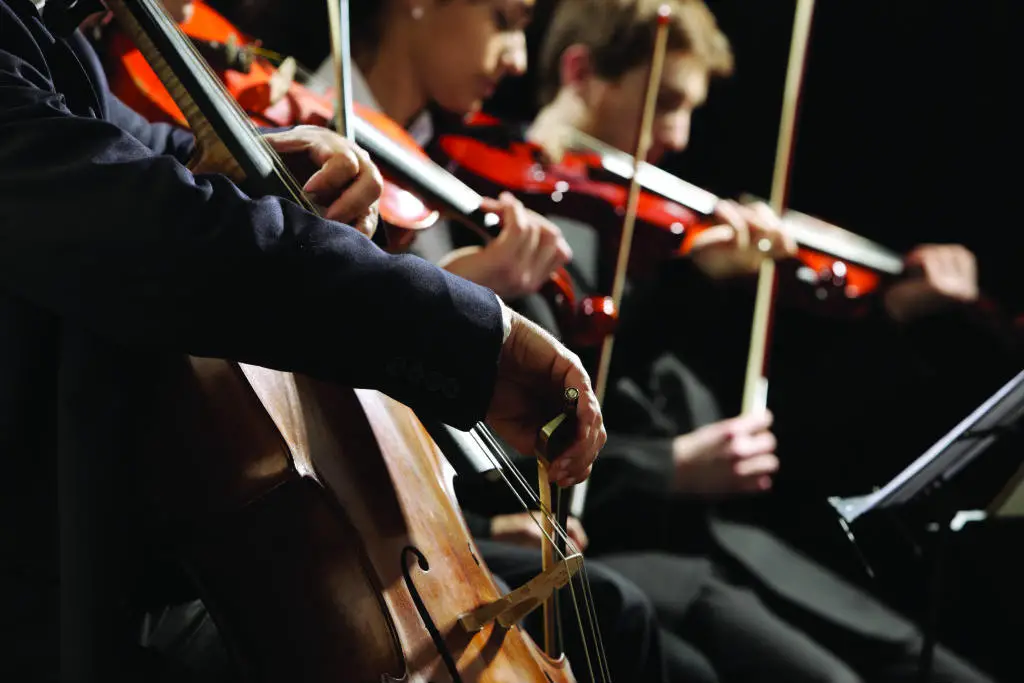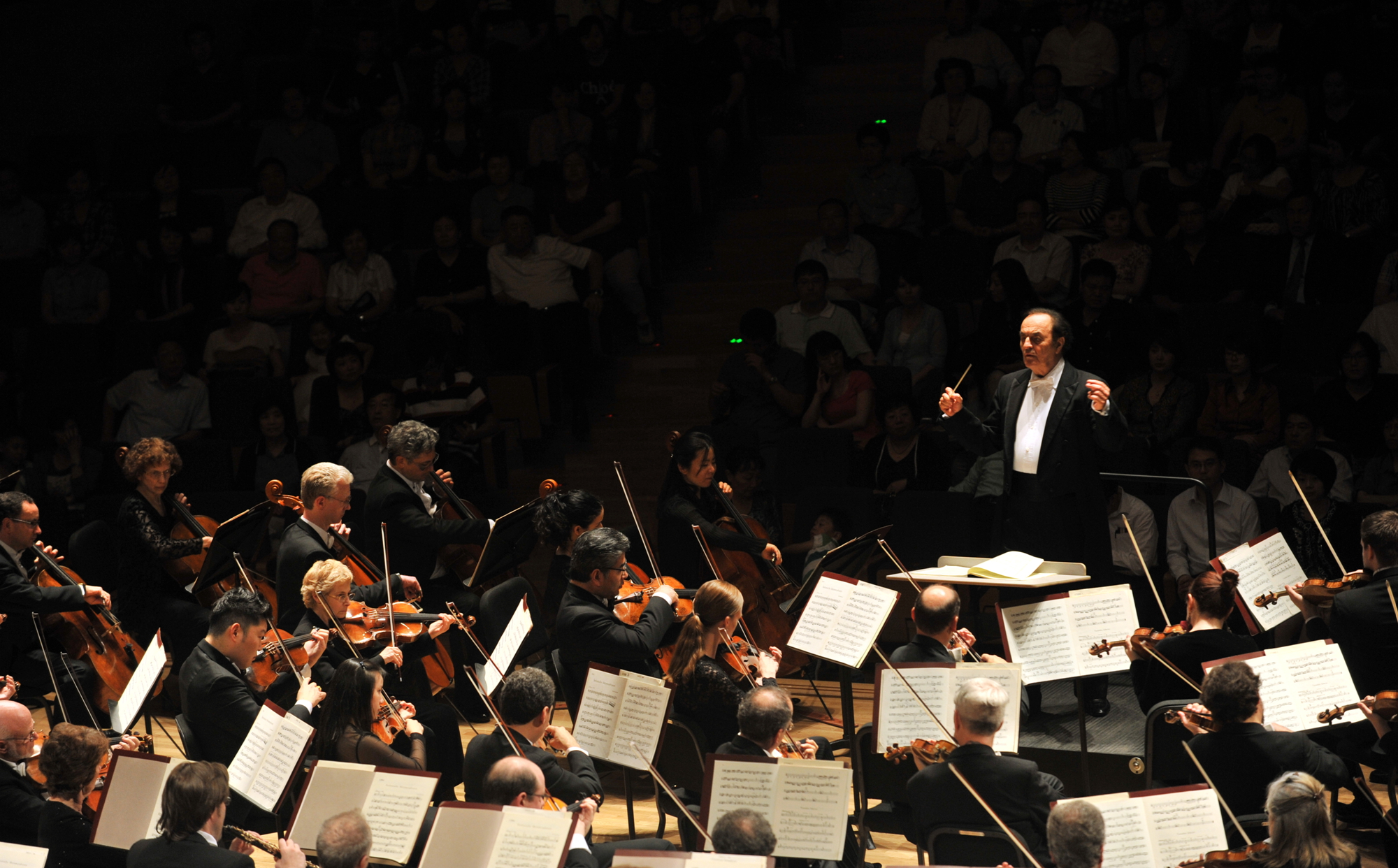The Original String Theory
If you think you hate the genre, then you don’t really know what it is.
By Gwynn Lyons, Stanford University
I can’t help but get goosebumps when I listen to a piece like Rachmaninoff’s “Piano Concerto No. 2.”
The roiling piano melody and soaring string accompaniment seem to lift me out of my chair, and I feel a combination of exhilaration and peace, similar to the moment when you step out of a plane and begin to fall, the world hanging before you like a distant canvas.
Everyone has some form of escapism, whether it’s going for long runs or taking drives. My form of escapism is classical music. I am saddened to see how unpopular it has become, given the joy it has brought me and the potential it has to bring the same joy to others.
The Decrescendo
The declining popularity of classical music may have something to do with changes in musical trends over time. Go to any classical music concert today, and you’ll see a sea of gray hair and glasses. Compare this to the demographics of classical music concertgoers in 1937 in L.A., whose average age was 28, according to “Slate.” As the older generations thin out and are replaced by younger generations who aren’t interested in classical music, the overall demand decreases.
But why are millennials more likely to jam to Beyoncé than Mozart? Some have hypothesized that younger people have shorter attention spans, leading them to prefer the shorter lengths of modern pop music to the longer, more attention-consuming forms of classical music.

I prefer the explanation that my generation’s preference for modern over classical music is due to the genres’ differing content. Music evokes the time period in which it was composed. The lion’s share of classical music was composed several centuries ago, calling to mind distinguished ladies in hoopskirts and gentlemen in Abe Lincoln top hats, a lost age that seem to have no relevance to the present. On the other hand, pop music, like Beyoncé’s album Lemonade, is clearly motivated by recent social events that we see shaping the world right now, such as Black Lives Matter. Millennials want to listen to something that speaks to their reality.
Another reason for classical music’s perceived inaccessibility has to do with well-founded criticisms about its exclusivity. It is true that classical music has historically been the prerogative of the privileged, since concerts and lessons cost money. It is equally true, and even more problematic, that classical music’s canon is heavily Western, excluding music of other cultures. As a genre, classical music regrettably carries the connotation of elitism.
As an experience, though, classical music, just like any kind of music, touches a universal nerve. Even if you know nothing about music, you can still appreciate the heart-rending beauty of Ave Maria. The emotional connection that classical music offers not just to the past, but to all humanity across time and space, transcends boundaries of race and class. At its core, classical music is as inclusive as any art form.
The Benefits of Beethoven
Once I became part of the world of classical music, I discovered, despite my conception of it as an arduous endeavor requiring hours of boring repetition, that creating it was actually quite fun.
Classical music—and music in general—is inherently a social activity. All music implies a listener; it connects the performer and the listener. Further, musicians who play together are connected in the shared goal of making something larger than themselves. To add a piece of oneself to this common project is to support one’s fellow performers while also being supported by them, bringing out the best in everyone.
Classical music provides a useful lesson about the universal quest for self-betterment. Classical musicians strive for perfection but never achieve it. Narrowing the gap between perfection and my current level is, for me, one of the most fun aspects of the craft. It reminds me that there is always room for improvement and that even world-class musicians are not perfect. This fact pertains to life in general, simultaneously checking one’s sense of accomplishment and motivating one to keep chasing perfection.
For the holdouts who still are not convinced that classical music has something to offer everyone, especially people who prefer non-classical music, I provide one last point: the dichotomy between classical music and non-classical music is artificial.
Every genre of music impacts the others, and the intersection between them makes it impossible to differentiate “classical” from “non-classical” music.
Consider the Lana Del Rey song “Old Money,” a pop song produced in 2014. Now consider Nino Rota’s “Romeo and Juliet,” starting sixteen seconds in. The melody is exactly the same (though whether this was intentional, I don’t know). Does this mean that Del Rey’s song should be considered classical since it samples a classical melody? Probably not, but it does show that no music is created in a vacuum; classical music provided the shoulders on which modern music stands. To categorically reject classical music as a genre on the basis that it is irrelevant to music being produced today is to reject the foundations of modern music.
All this is to say that classical music is misunderstood, and that it has more relevance and value to modern life than people realize. To recognize this relevance and value is not to deny the importance of pop music, but to acknowledge that both are variants of the same species of human art. Perhaps the rise of pop music represents a natural evolution in music and the resting skeleton of classical music should remain in the grave, but I prefer to think that it can come back somehow. Even if the world has turned its ears to something else, I will still be listening.


















Hey Gwynn,
I absolutely love how you opened your article by mentioning Rach’s 2nd piano concerto. I first heard it years ago, and I still listen to it at least once a week. It is truly a composition of genius with a depth, style and breadth that is matched by very few other compositions, classical or not.
I understand that the focus of your piece was not about composers or particulars in classical music, but, if you don’t mind, I would like to add a few more composers that might interest your readers. Beethoven, Chopin, Mozart, and Bach are no doubt household names, but the tremendous diversity in the styles of classical music warrant some effort on my part to hopefully help a young listener explore the hidden beauty in classical music.
Shostakovich is known for his sharp style, and I recommend his jazz suites, quartets (esp. 8), and symphonies (esp. 5). Liszt is known for his technical virtuosity, flamboyance, and lyricality, and I recommend his La Campanella, Transcendental Etudes, and Liebestraum (one of the most beautiful piano pieces you will hear.) I recommend Tchaikovsky and his piano concerto (esp. 1), along with his famed violin concerto, Nutcracker, and Romeo and Juliet. I recommend Dvorak’s New World Symphony (you will recognize the opening tune of the fourth movement, and perhaps even those of the rest), Edward Elgar’s Enigma Variation, Gustav Mahler’s symphonies (esp. 5, you will notice how much Mahler influenced Shostakovich), Bela Bartok, Gustav Holst’s Planets, Vaughn Williams (esp. fantasia on theme by teller), and both Johann and Richard Strauss.
There are so many other composers that I haven’t included (prokofiev, britten, copland, satie etc), but I believe that the composers that I’ve listed will provide a good backbone for exploring others.
You also mentioned a few contemporary songs with clear influence from classical music, and I would also like to add another. Cabello and MGK’s 2016 hit “Bad Things” borrows the bass line from Pachelbel’s Canon in D.
Thanks. I enjoyed reading your article. As a writing intern as well, I look forward to reading your pieces going forward.
Wishing you the best,
Sincerely,
Jonathan Kim
Salini Impregilo celebrates Toscanini, a fascinating and talented artist, 150 years from his birth.. https://www.salini-impregilo.com/en/press/toscanini/
I do not think that Rachmaninov’s piano concerto is a good starting point for neophytes. Even less so is Mahler. And Bartok?? You have got to be kidding! These are acquired tastes that only an experienced classical music afficionado can appreciate. Music such as Brahm’s symphonies have done more to turn people off to classical music than any other classical genre.
My recommendations would be Baroque music such as Vivaldi and even pre-Baroque music, Bach, certain piano pieces of Scriabin, Ravel’s piano concerto in G preferably performed by Grimaud, and Beethoven’s Triple Concerto. Young performers such as Wang and Trifonov continue to make classical music exciting and, yes, relevant.
Classical music differs from other music in that it explores a much wider and deeper range of human emotions. Other music genres are extremely limited in expression by comparison. A classical music piece can be seen as a journey with a beginning, a middle, and an end, much like a human life, with all of the ups and downs along the way.
In my view the issue is that classical music is multi-dimensional whereas pop music is one-dimensional by which I mean that pop music’s accessibility lies in the fact that one piece of music equals one single emotion that is being expressed and in classical music there is often a kaleidoscope of emotions within one single piece. Classical music tries to address the soul on many levels which makes it a complex, sometimes challenging journey. It requires of the listener to be ready and to engage in it.
A society that is suffering from ADD and reaches for cheap and fast-food like escapes all the while avoiding to meet one’s true soul naturally will not have a place for something that invites us to go deeper such as music that may challenge us. This is not to say that there is anything wrong with pop music at all, it may well serve as a first doorway into the inner self, and sometimes a simple joy on the surface can be just what the doctor ordered.
I am an experienced consumer and player of classical music. Bach, Handel, Mozart, Ravel, Debussy, Tchaikowsky, even Stravinsky……….all good. But Brahms and Mahler……boring, rambling, unfocused, wandering around looking for something to say. Haydn is quaint and basically dinner background music. And played with no vibrato strings, it’s just annoying.
[…] genres. One of the best and the longest ones in history is classical music. You can learn more at StudyBreaks on Classical Music. However, it’s confusing many men and women. The truth is that most people today (in the […]
[…] the classical music issues, you should click here to read more. There is a distinct difference between hearing and listening. The short version of the story is […]
[…] each is a sub-genre, together they form the genre we know today as classical music. If you read the viac StudyBreaks, you can learn the misunderstood joy of classical music. Below are the benefits of listening to […]
[…] goosebump moment at a live concert. If you’d like to share your stories, check out more over at Study Breaks. Connecting with others who share your love for classical music can amplify the joy it […]